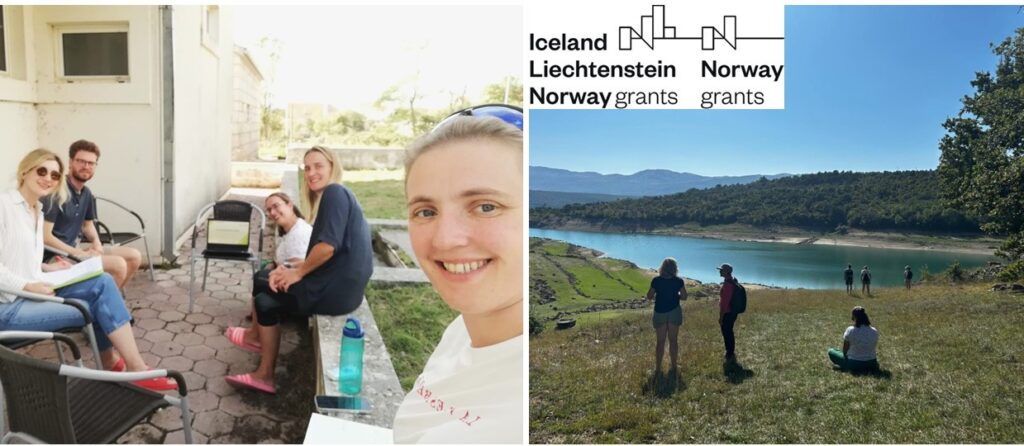The results of the EJWP case study, “Increasing the visibility and sustainability of the Ecological Station Vrlika.” as part of the WatNex project, were presented in Zagreb on 25 September during the EJWP Training Week in Croatia, and in a workshop linking like-minded European projects. The Ecological Station Vrlika case study included applications of best practices from Europe in outreach for awareness and business plan development for the facility.
Vesna Gulin Beljak, EJWP Participant and Research and Teaching Assistant at the University of Zagreb; and Mirela Sertić Perić, EJWP Participant and Associate Professor at the University of Zagreb, shared their views in working on this case study with her EJWP group colleagues.
1) How was this project case study different?
Vesna: For me, everything related to our Croatian case study/project was a completely new experience; I have never co-led a project before, nor worked on developing a business model. I saw this as a new learning opportunity from the very beginning. There were some challenges along the way, but I realized that you will never learn anything new if you do not fully commit to overcoming fears and embracing new opportunities! I found the process of working with my EJWP and University colleague Mirela and others very inspiring. I am not only proud of the end result, but also of the journey to get there.
Mirela: This EJWP project case study represents an exciting departure from our typical ecological science endeavors. Collaborating with our Norwegian colleague Aga within the framework of our WatNex initiative, supported through the Fund for Bilateral Relations of EEA Grants and Norway Grants, has been a unique and enriching experience. Unlike our usual scientific research focused on biodiversity and environmental impacts, this initiative centers around capacity building and networking. It’s been truly fascinating to leverage our scientific knowledge and apply it within the context of this project. We take great satisfaction in the opportunity to integrate our academic expertise and contribute to a broader audience’s understanding of the Water-Energy-Food Nexus, biodiversity, and climate awareness.
2) What what is like working with the various project partners?
Mirela: Working with a diverse set of international project partners certainly presented its challenges. Navigating various national laws and procedures, particularly concerning project activities and funding, was a task in itself. However, our ability to align our EJWP project with complementary activities from other initiatives, such as the iMERMAID Horizon project and NexusNet COST action, was a significant triumph. This strategic move expanded our networking horizons and bolstered the visibility of our efforts within WatNex and EJWP.
The pleasant surprise was the enthusiastic response to our Croatian case study presentations. Though we initially felt we hadn’t done enough, our audience’s reactions made us realize the true extent of our contributions in disseminating ideas and research findings. Our work is dedicated to empowering a multidisciplinary network of experts and stakeholders, highlighting the importance of biodiversity and ecosystem functioning in the context of climate change in Nexus systems. Organizing an international event, with participants from various countries was a logistical challenge. Additionally, maintaining a hybrid event with both in-person and online participants introduced its own set of difficulties, from schedule adherence to ensuring a stable WiFi connection.
3) What about the overall Training Week experience in Croatia?
Vesna: The week in Croatia was something I want to remember as an inspiration for a long time! Mirela and I enjoyed the company of our team members and the new EJWP5 team, who provided a breath of fresh air and fit perfectly into the atmosphere. We also tried to make the Croatian week a fully Croatian experience, including not only the urban atmosphere and culture, but also a bit of wilderness in the nature of the Vrlika region! I think this fit perfectly with the goals of our Watnex initiative – to raise awareness of the importance of biodiversity for Nexus systems.
I would love to see our project deliverables have an afterlife as we created a detailed business plan with short- and long-term goals and actions that could be implemented immediately, but as a team we also agreed to focus on the journey, and what we learned during the project rather than just the end results.
Mirela: Reflecting on the workshop in Croatia, it’s safe to say that Vesna and I are thrilled with the outcome. The workshop was a resounding success, and we take great pride in our ability to orchestrate it effectively. The feedback from participants has been overwhelmingly positive, affirming our belief that we executed the event well. Looking ahead, we are excited about disseminating our project results at upcoming conferences and future meetings within our group and among a wider audience. We anticipate the profound impact of our work, contributing to the sustainable development of water, energy, and food systems by raising awareness about the vital role of biodiversity and ecosystem functioning in the face of climate change in Nexus systems over the coming decades.

